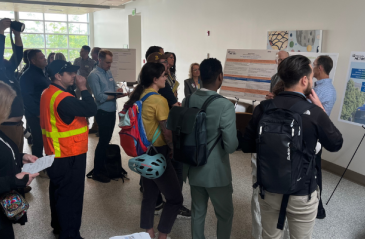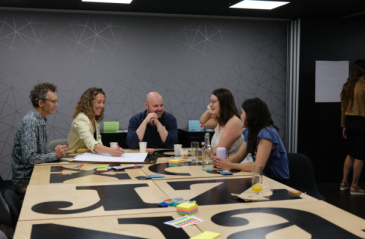
The information barriers holding back climate action and how to break them

Although #Timor-Leste is off the beaten track, it has huge #development potential thanks to its demographic dividend, says @RoyTrivedy
Share articleWhoever wins next month's elections in #Timor-Leste needs to prioritise #delivery and #implementation, says @UNDP's @RoyTrivedy
Share articleGovernment, youth and #civilsociety – including @UNDP and @RoyTrivedy – are set to come together to help move #Timor-Leste forward
Share articleWe put our vision for government into practice through learning partner projects that align with our values and help reimagine government so that it works for everyone.
The Timor-Leste National Human Development Report 2018 was launched in Dili a couple of weeks ago.
Reports like this often generate a brief period of high profile media coverage in capital cities and then end up lining the bookshelves of policy makers and academics in key urban centres.
But having arrived in the country just three weeks ago as incoming UN Resident Coordinator and UNDP Resident Representative, it has been great to see that the country's government, Flinders University and the UNDP - which worked together to produce the report - are determined to ensure that it does not follow the usual trajectory.
Instead, we are using it to generate a nationwide public discussion and debate across all sectors about the key issues' that will shape the country's future development, including during the run-up to the 12 May parliamentary elections. But we recognise that ultimately the impact of the report must be judged by the follow-up action that it generates.
The report argues that Timor-Leste has a unique opportunity to accelerate sustainable growth, improve development outcomes and achieve progress in line with its development aspirations and the Sustainable Development Goals.
Timor-Leste is one of the youngest in the world with 74 per cent of the population aged under 35, making it the second youngest in the Asia-Pacific region, after Afghanistan, and 15th youngest globally. Consequently, it is vital to engage and involve young people in the country's development.
The report shows that in addition to the existing age profile of Timorese citizens, with the largest proportion of citizens in the ‘most productive' age range, in recent years the fertility rate in the country has also been declining (from 7.8 children per Timorese mother in 2013 to 4.3 in 2016) and moving closer to the global average. The report argues that this combination of factors makes it possible for Timor-Leste to maximise the opportunities for sustainable growth and reap the benefits of a demographic dividend. But this is neither automatic nor inevitable. To make the most of this opportunity, the follow-up work now needs to start.
The right investments need to be delivered in a timely and relevant manner. For Timor-Leste to achieve this vision it will require the new government formed after the upcoming election to accelerate implementation and carefully consider the main recommendations including: allocating 25 per cent of the national budget to education and training of youth; strengthening the quality of education; incentivising the private sector to invest in more training and creation of decent work opportunities; and widening access to primary health care and family planning.
It is exciting to see that this work has already started with passionate discussions involving young people, civil society representatives, business leaders, policy makers and development partners in Dili.
At a public seminar and policy debate held the day after the report launch, a panel consisting of youth, civil society and government representatives discussed and debated the report's conclusions. Important questions were raised about the need to ensure implementation of existing policies - such as the National Youth Policy - to achieve results and ensure that youth living in rural areas can access the same education and training opportunities as those based in Dili. Youth representatives also acknowledged that they have a vital role to play in using their skills to find solutions to national challenges and motivate other young people.
Through this process, the aim is also to build a cadre of highly motivated and committed people and institutions throughout the country who can implement programmes that galvanise action to enable to Timor-Leste to maximise the opportunities provided by the youth dividend.
Exciting times for sure - watch this space for further updates.












